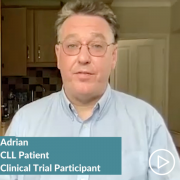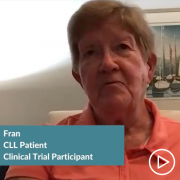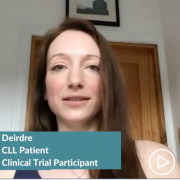Have There Been Advances in Screening for a Breast Cancer Recurrence?
Have There Been Advances in Screening for a Breast Cancer Recurrence? from Patient Empowerment Network on Vimeo.
Have there been recent advances in screening for breast cancer recurrence? Expert Dr. Bhuvaneswari Ramaswamy explains where things stand with screening, reviews advances that could be approved soon, and shares her advice for pro-active lifestyle steps that patients can take.
Dr. Bhuvaneswari Ramaswamy is the Section Chief of Breast Medical Oncology and the Director of the Medical Oncology Fellowship Program in Breast Cancer at The Ohio State College of Medicine. Learn more about this expert here.
See More from Thrive Breast Cancer
Related Resources:
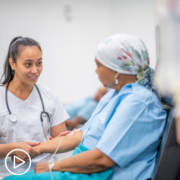
|
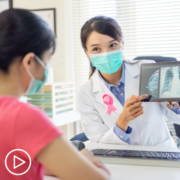
|
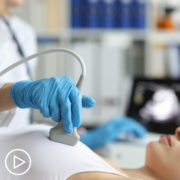
|
Transcript:
Katherine:
Susan wants to know, have there been any advances in imaging or screening for a recurrence? And can anything be done to help prevent a recurrence?
Dr. Ramaswamy:
So, let me answer the first question. So, we did – we have done clinical trials where patients got imaging that meaning CT scans even if they don’t have symptoms every four months, as opposed to the other group had only scans when they got symptoms. And we looked at two outcomes. One is, are they surviving longer? Because that is, of course, our primary goal. But actually, the secondary goal was, is their quality of life better?
Katherine:
No.
Dr. Ramaswamy:
Many of us knew that survival is not going to improve because we understand this disease. So, you did not. The two groups do not have any difference in survival, but we were very surprised to see even the quality of life was not improved. That’s because every time you have a scan, there’s a lot of anxiety what you’re going to say. And then if there is some ditzel somewhere that could be nothing at all, now they say, I’m not sure whether it’s inflammatory or metastatic. Now you have to go and biopsy. Now the biopsy can lead to some side, I mean, some complications, or sometimes we’ll say, no, we can’t biopsy it. We’re going to watch it closely.
Now it’s easy for me to say, and then I’ll walk out and go and see the next patient. But you are going to carry this heavy burden in your mind and think about, oh, my God, four months I’m going to wait. What if it’s grown? So, there’s a lot of anxiety that induces that we are not able to address. So, that’s why we don’t do routine imaging for all patients. But we have a very low threshold to do the imaging if you have symptoms that we are concerned about.
And I generally educate my patients any persistent progressive symptoms. So, two-piece persistent progressive symptom. Please call, don’t even wait for the next appointment, and then we’ll move forward from that. So, as far as imaging, I can’t say that we have a better tool to identify those little mats and do something better. But like I had said before in this particular meeting, we are now looking to see whether we can find that circulating tumor cells or circulating in tumor DNA.
And if that proves out to be good, we have some late FDA approval of a test. But if it is going to impact patients’ lives by doing this on a routine basis and we think we can start the treatment earlier and impact their outcomes, you are going to have another test that we can do, which is even simpler, which is just a blood draw test.
So, I think we are going in that direction, and we’ll know a little bit more soon. Now, your second question was, can we prevent a recurrence? So, everything that we are doing is to prevent a recurrence, right? Because if you think about it, your tumor is going to be removed by surgery, and so it’s out. And we are going to do additional radiation, which to just kind of pick those little cells if they’re left. And in certain circumstances, I would say in most circumstances we would do radiation. But we are also doing all these treatments that we talked about, chemotherapy, antiestrogen therapy. We are doing it longer. We are doing anti-HER2 therapy. We’re trying to pick those high-risk patients who didn’t respond so well. We are giving them more treatments to treat. They’re all to prevent a recurrence.
That’s what we are doing. But the – I’m – we did talk about two other things as well. Exercising, eating right, making sure you’re not gaining weight, and making sure you’re engaged because your reduced stress and lack of – increased happiness improves good cells in your body, less inflammation in your body, all of this will help. Okay? And no doubt all of this too is to help your – reduce your recurrence. But the thing is what we are not able to say to a patient is that, okay, we’ve done all this, 100 percent you’re not going to have a recurrence. We don’t have that level of confidence in what we do. We can say you reduced your risk of recurrence, but we can’t just say you have zero chance of recurrence. That’s where we still can improve and we’ll continue to do better, so.

